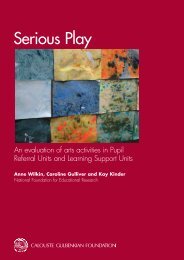Why Restorative Justice? - Calouste Gulbenkian Foundation
Why Restorative Justice? - Calouste Gulbenkian Foundation
Why Restorative Justice? - Calouste Gulbenkian Foundation
Create successful ePaper yourself
Turn your PDF publications into a flip-book with our unique Google optimized e-Paper software.
THE VICTIM<br />
Nevertheless they generally appreciate the offer and in the vast<br />
majority of cases feel it is appropriate. 8<br />
Victim Statements provided to the bench before sentencing<br />
seemed a step in the right direction. These were designed to provide<br />
victims with a voice in the court system. They were piloted in six<br />
areas in the UK in 1996–7. But the research showed very mixed<br />
results, as the statements seemed little different from victims’<br />
original statements to the police. Victims rarely knew what use the<br />
courts made of them, if any, and often felt confused and let down.<br />
Courts were wary of passing sentences which depended solely on<br />
the effect the crime had on the victim. 9<br />
While politicians still talk about ‘getting tough’ on offenders, it<br />
is important to note that many hundreds of victims have expressed<br />
their willingness to meet their offenders and talk to them. Punishment<br />
is not their goal, safety is. Despite the political rhetoric about<br />
vicitms, their willingness to try restorative approaches is driven by<br />
the lack of help and attention received by victims from the criminal<br />
justice system. They see mediation as giving them a way of rebuilding<br />
confidence and control over their lives.<br />
The 1998 British Crime Survey showed a surprisingly high<br />
level of interest from victims in a restorative or reparative meeting<br />
with their offender. Forty-one per cent said they would accept<br />
such an offer, fifty-six per cent said they would not, and three per<br />
cent were unsure. Fifty-eight per cent were interested in reparation.<br />
10 However, these figures concern only a hypothetical interest<br />
in restorative justice. Victims who have actually been through the<br />
process are even more positive (see page 30).<br />
Mediation addresses victims’ need for:<br />
• reassurance that the offence will not happen to them again<br />
• an explanation as to why they were chosen – many victims<br />
8 Crime Concern, Evaluation of the VOICES Project (Woking, Crime Concern, 1999).<br />
9 C. Hoyle, E. Cape, R. Morgan and A. Sanders, Evaluation of the ‘One Stop Shop’ and Victim<br />
Statement Pilot Projects (Bristol, University of Bristol, Department of Law and London, Home<br />
Office Research, Development and Statistics Directorate, 1998) and R. Morgan and A. Sanders,<br />
The Uses of Victim Statements (Bristol, University of Bristol, Department of Law and London,<br />
Home Office Research, Development and Statistics Directorate, 1999).<br />
10 J. Mattinson and C. Mirrlees-Black, ‘Attitudes to crime and criminal justice: Findings from<br />
the 1998 British Crime Survey’. Research Findings No. 111 (London, Home Office Research,<br />
Development and Statistics Directorate, 2000).<br />
28

















